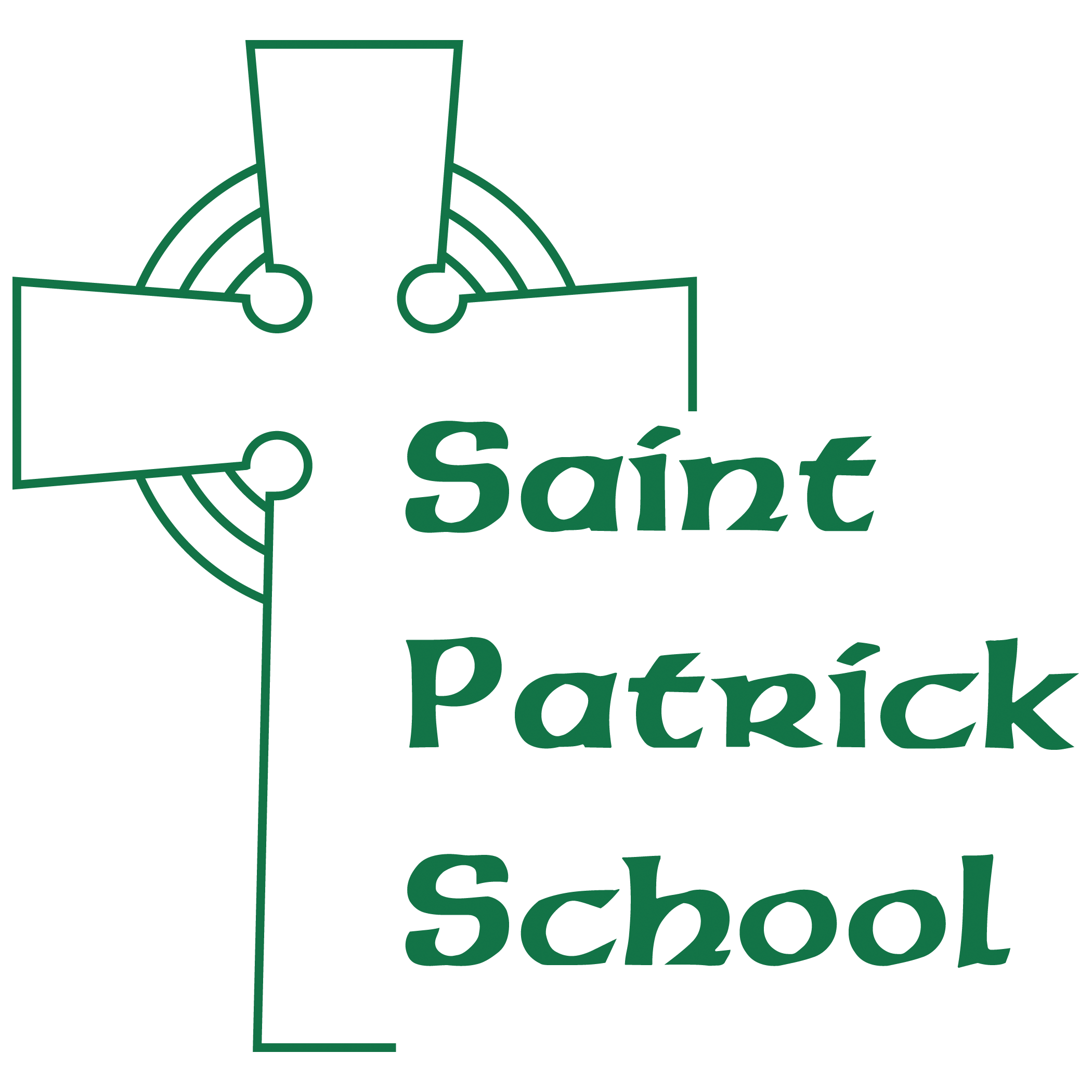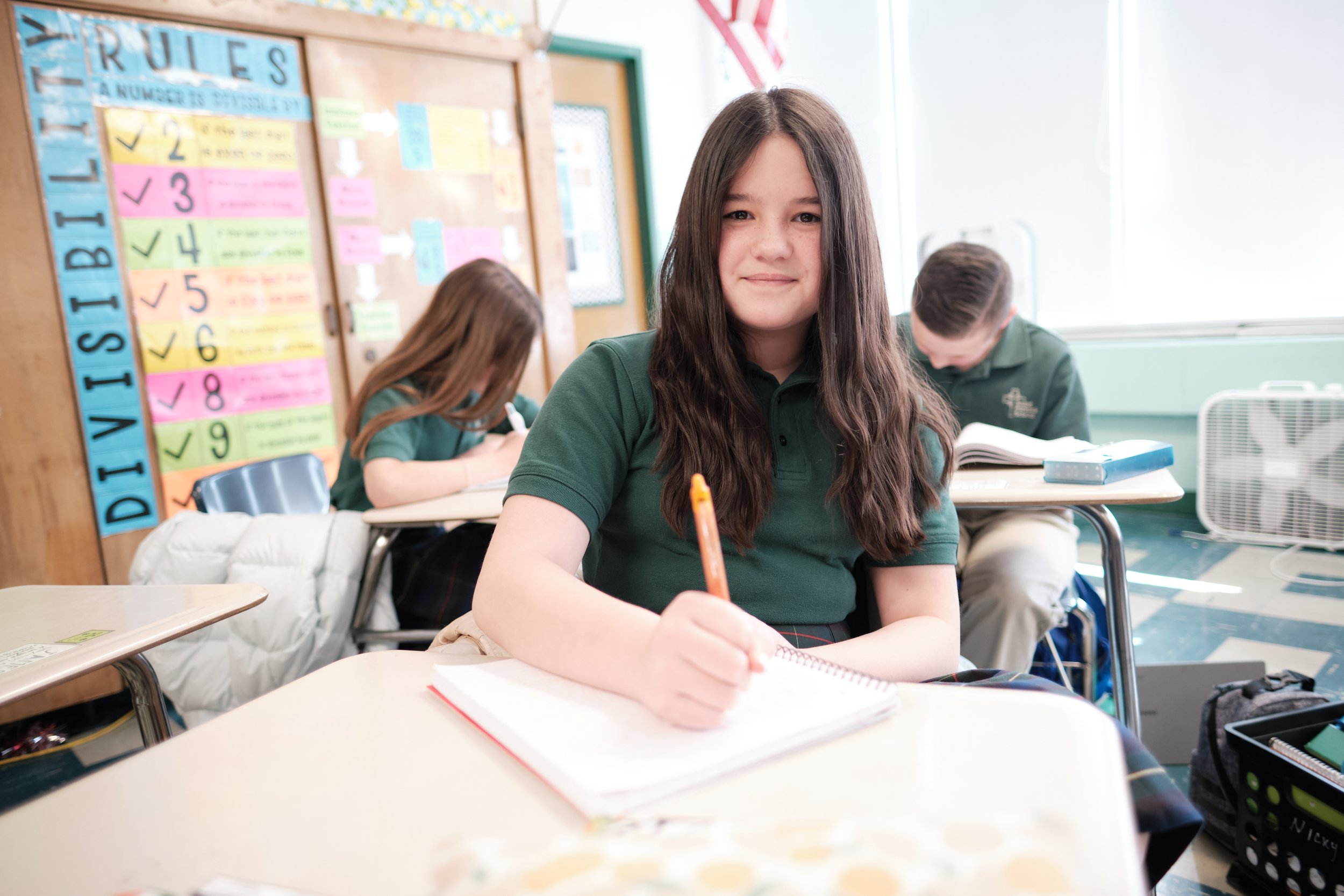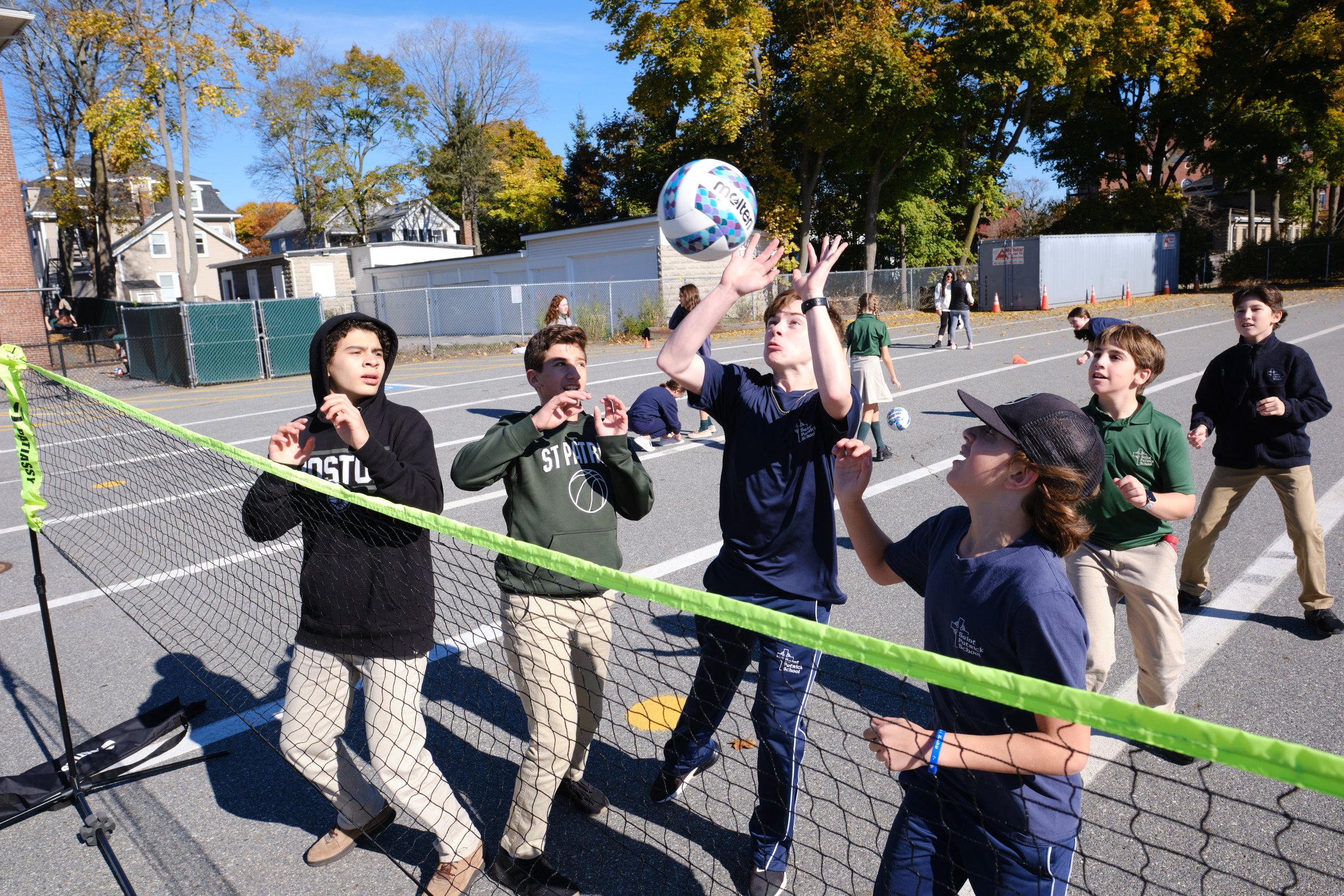Overview
As a middle school student at St. Patrick School, you’ll be part of a faith-filled community rooted in Christian values and Catholic traditions. Here, we support your growth not only as a learner, but as a person—encouraging you to take responsibility for your choices, your conduct, and your academic progress.
You’ll have opportunities to develop independence and personal accountability, while being supported every step of the way. Collaboration is a key part of our classroom culture; you’ll learn to listen respectfully, share your ideas with confidence, and grow through meaningful conversations with your peers.
No matter your starting point, you’ll be challenged to reach higher and strive for your personal best. Through strong role models and high expectations, you'll build both confidence and humility. And if you’re ready to accelerate your learning, you may have the opportunity to join our advanced mathematics track, where you’ll dive deeper into concepts and move at a faster pace.
At St. Patrick, we’re here to help you become the thoughtful, capable, and faith-filled person God calls you to be.
+ MATHEMATICS
In middle school, we use Big Ideas Math: Modeling Real Life, a research-backed, comprehensive math program designed specifically for middle school students. It focuses on building a deep understanding of mathematical concepts through real-world applications, problem-solving, and a coherent progression of learning from grade to grade guiding students through key math concepts using hands-on projects, cooperative investigations, and real-world problem solving. Students build skills in reasoning, precision, collaboration, and critical thinking, often asking themselves, “Does this make sense?”
In 6th grade, students strengthen foundational skills through engaging activities like designing calendars of operations, creating 3D nets, exploring scale in model building, and analyzing their own running times using data collection and graphing.
7th grade projects include using scale to measure aerial photos, budgeting restaurant expenses, and applying geometry to product packaging. Students also explore basic statistics, survey design, and even get an introduction to the stock market through mock investments.
Students in the advanced 7th grade math track move at a faster pace and begin exploring Algebra I concepts such as slope, linear relationships, and triangle similarity. They apply what they learn through creative projects like designing their “Dream Room” using specific math constraints and tools like Desmos and Google applications.
In 8th grade, students explore real-world math—from calculating living expenses to transforming drawings into coordinate-based designs. They connect equations, tables, and graphs to understand how math models real-life situations.
The advanced 8th grade Algebra I program dives deeper into linear, exponential, and quadratic functions. Students extend their understanding of exponents, apply models to real data, and complete major projects like The Story of Slope, City Design, Tessellations, The Stock Market, and My Life – Beyond High School.
+ ROMAN CATHOLIC THEOLOGY
Middle school students deepen their knowledge of the Catholic faith through the Spirit of Truth curriculum by Sophia Institute Press and they bring it to life through practical, lived experiences. Students gather together with the school for monthly Mass, adoration of the Blessed Sacrament, and personalized faith conversations with their staff mentor. Additionally, middle schoolers engage in community service projects and offer their guidance to their younger school buddies. Throughout each of the middle school years, research and writing assignments augment students’ understanding of faith content.
Overall, religion class in middle school has the following goals:
To promote a knowledge of faith, the liturgy, and the Sacraments and to promote moral formation in Jesus Christ. To teach the Christian how to pray with Christ, how to live in community and to participate actively in the life and mission of the Church. To promote a missionary spirit that prepares the faithful to be present as Christians in society.
In Grade 6, students spend the year immersed in God’s Word in Sacred Scripture by understanding how it is used at Mass and in personal prayer. Students also explore how the Bible records God’s plan of salvation through the covenants mediated through Adam, Noah, Abraham, Moses, David, and Jesus.
In Grade 7, students explore Jesus and the Gospel message, with an emphasis on unifying themes in Scripture and an in-depth examination of the four Gospels. Students also understand each of the sacraments through their roots in Sacred Scripture and Sacred Tradition.
To conclude their middle school experience, Grade 8 students build on their understanding of personal growth, with an emphasis on the vocation to love and the responsibilities to God and each other.
+ ENGLISH & LITERATURE
The language arts curriculum is comprised of three components: grammar, vocabulary, and literature, and is aligned with the Common Core curriculum. Students receive instruction in the proper grammar of the English language as it relates to written and oral communication.
Students in the middle school language arts program become proficient in formal writing such as persuasive, narrative, and expository essay writing. Students in seventh and eighth grade complete a research paper and learn the basic skills of gathering research, analyzing it, and writing a research paper using primary and secondary sources in preparation for high school.
In addition to text-driven vocabulary, a supplemental vocabulary program entitled Wordly Wise is used in conjunction with the grammar component to expand the student’s vocabulary and allow the students the opportunity to apply their newly acquired vocabulary in daily reading, writing, and speaking.
Literature for 6th, 7th, and 8th grade students is mainly studied through lively class discussions, as well as in-depth written reflections. Students in these grades will work to understand the plot, characters, setting, themes, and literary devices of the literature being read. In addition, they will also be asked to analyze works of literature by reading in-between the lines. These works include fiction, short stories, non-fiction, drama, and poetry.
+ HISTORY
The students in sixth grade will embark on a journey through the ancient world, studying the rich histories of ancient civilizations such as Mesopotamia, Egypt, Greece, Rome, India, and China. Using a classical education approach, we emphasize deep reading of primary sources, critical thinking, and Socratic discussions to help students understand the cultural, political, and social foundations of these societies. Through reading and writing, map studies, and interactive timelines, students will gain a comprehensive understanding of how these ancient civilizations have shaped our modern world.
Our seventh grade curriculum offers an in-depth study of the history of Christendom, from the early Church through the Middle Ages. Students will examine the development and influence of Christianity on European society, culture, politics, and art. Using the Catholic Textbook Project, students will engage with a variety of primary sources such as the writings of the early Church Fathers, medieval manuscripts, and historical texts to foster an understanding of the Church’s influence on Western Civilization. Through the careful study of Christendom, students will gain a deeper appreciation of the roots of Western civilization and the enduring impact of Christianity on our society.
Our eighth-grade curriculum immerses students in the rich history of the Americas, from early colonization to the American Civil War. Following a classical education model, students explore pivotal events, foundational ideas, an influential figures that have shaped the United States. Students will engage with primary sources such as the Declaration of Independence and the Constitution, write essays, and engage in debate and discussion to further critical thinking skills and understanding of American history. Our goal is to provide students with a thorough understanding of American history, preparing them not only to be informed citizens, but also proud of their country.
+ SCIENCE
The curriculum for Science at St. Patrick’s School Stoneham is a spiral curriculum which encompasses all the sciences (Life, Physical and Earth/Systems) each year. Each unit begins with a review of the previous year’s content, and move to be more in depth each year. This allows students to have exposure to all the fields of science each year.
As the new NGSS states:
“Science is also at the heart of the United States’ ability to continue to innovate, lead, and create the jobs of the future. All students—whether they become technicians in a hospital, workers in a high tech manufacturing facility, or Ph.D. researchers—must have a solid K–12 science education.”
This year, the science curriculum will also introduce more engineering work. Throughout the year, students also work on scientific skills, such as carrying out experiments, scientific argumentation, using and recording data and using experimental evidence to support scientific claims. The focus of the curriculum is mastery of these skills and applying them to all of the different content areas in science.
+ SPECIALS
Students in Middle School participate in specials that compliment the rigorous classroom curricula throughout the school year. Art, Physical Education, Music, and STEAM are offered. Middle School students take Spanish 3 times per week.
















